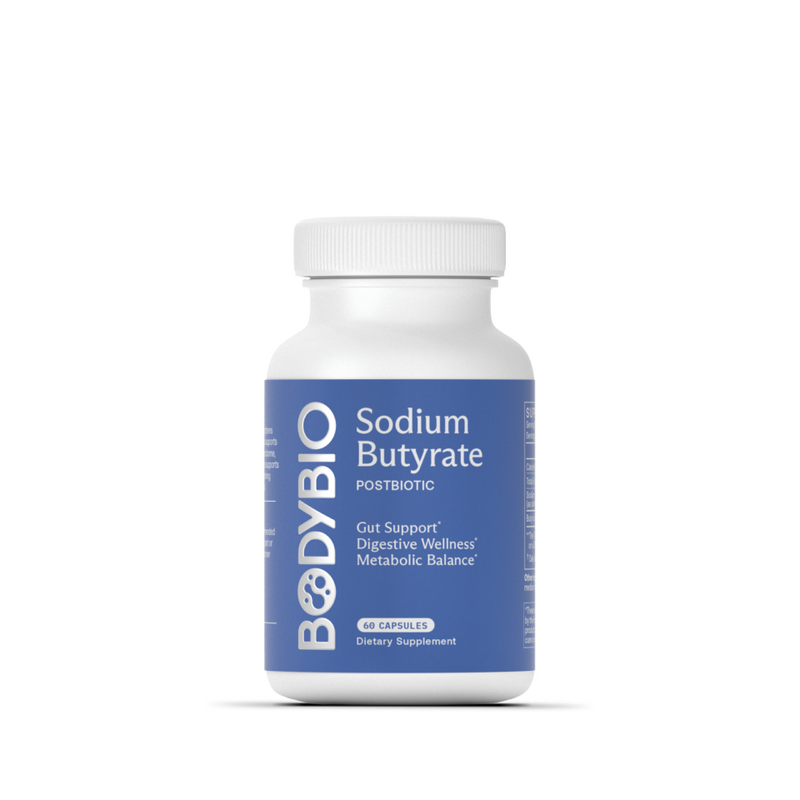What Is the Gut Microbiome? The Ecosystem that Supports Digestion
Authors:

Dr. Thomas Wnorowski
PhD, CNCC Research Director, BodyBio & Biomedical Nutritionist
Key Takeaways:
Key Points:
- The gut microbiome is incredibly influential when it comes to your digestive and immune health. It’s made up of thousands of bacterial strains and trillions of individual bacteria.
- A powerful gut ecosystem consists of both healthy and unhealthy bacteria. You’ll also find things like fungi, viruses, and even parasites in a healthy person. Diversity shouldn’t be feared — what matters is exactly what types of bacteria have the most space and influence.
- You can improve your gut microbiome by eating more fibrous and prebiotic foods, avoiding unnecessary pharmaceuticals (when possible), and limiting processed foods and sugar.
When looking to improve gut health, we often consider factors like diet, lifestyle, stress, and even the structural components of the digestive tract. It’s only in recent years that we’ve discovered an entire ecosystem of microorganisms living in and influencing our digestion.
Whenever we explore health, we want to look at the whole picture. Certainly, diet and lifestyle factors have a lot to do with digestion. But taking the microbiome into account allows us to get a more well-rounded view, optimizing our ability to fully heal.
Let’s explore the gut microbiome, what it is, and how we can harness it for ultimate digestive, immune, and mental well-being.
Table of Contents:
- What Is the Gut Microbiome?
- Gut Flora Imbalance Symptoms
- How to Improve Gut Microbiome Health
- Accelerate Healing with Butyrate
What Is the Gut Microbiome?
The gut microbiome is an entire ecosystem made up of trillions of microbes that live in your gut (in particular, the large intestine). Their role is to influence digestion and the immune system — while communicating regularly with the brain via the gut-brain axis.
Some gut microbes are considered healthy and others are unhealthy, but you’ll always have a mixture of both (so don’t assume you can eradicate all bad bacteria from your gut). The important thing is that the healthy bacterial strains outnumber the pathogens, and control the ecosystem.
A healthy gut microbiome helps digest fiber, produce short-chain fatty acids like butyrate, support an active immune system, boost metabolism, and maintain positive mental health. As for the bacterial strains, each person’s gut flora is completely different. You’ll inherit some bacteria from your mom during birth and nursing, but throughout the years, you will develop your own gut microbiome as unique as a fingerprint.
Keystone Species Microbiome and Their Role
As we mentioned before, there’s a hierarchy when it comes to the gut microbiome. Remember, these are living organisms — and they have unique ways of communicating that we don’t yet fully understand.
Within this hierarchy, we have bacterial strains that are considered keystone species. These are the strains that have tremendous influence over the entire microbiome and its function, although they aren’t necessarily the most abundant. For example, Akkermansia muciniphila is considered a keystone species.
Recent studies suggest that chronic gut imbalance could have more to do with depleted keystone species than depleted bacteria in general. One study states that “the abundances of certain keystone species are responsible for the individuality of the human gut microbiome.” Meaning that your unique microbiome depends on keystone species to function at its best.
This further explains why it’s not always the volume of healthy bacteria in the gut that makes a difference. Instead, it’s the diversity of bacteria, especially keystone species, that dictates the health of your gut.
Gut Flora Imbalance Symptoms
Gut microbiome imbalance (often synonymously referred to as gut dysbiosis) is becoming more common — especially as Western diets turn to highly processed foods, which can feed unhealthy bacteria. Pharmaceutical drugs also play a role in gut microbiome health (especially antibiotics) because they kill both unhealthy and healthy bacteria.
If you suspect a gut flora imbalance, here are some symptoms to watch for:
- Bloating
- Gas
- Abdominal pain/discomfort
- Yeast infections
- Brain fog
- Insomnia
- Skin rashes or breakouts
- Poor mental health
- Trouble digesting fiber
- Unexplained weight fluctuation
- Frequent infection
- Overactive nervous system
- Leaky gut
- Allergies or histamine intolerance
Gut dysbiosis isn’t uncommon — and neither are many of these symptoms. But it’s important to address any suspected gut issues with diet, lifestyle, and targeted supplements so your microbiome doesn’t fall into further disrepair.
Understanding the Microbiome Gut-Brain Axis
Have you ever felt stress manifest in your gut? When we experience these feelings, we’re seeing the gut-brain axis in action.
Let’s put this into more scientific terms. The enteric nervous system (ENS) connects your entire digestive tract to your brain — which means the two constantly communicate. It sounds a bit sci-fi, but your emotions can very easily dictate what happens in your GI system as the brain transmits information to the ENS and microbiome.
This is a good thing. It’s a method your body uses to protect itself against harm (usually in the primal sense). But if stress becomes chronic, it can translate into gut dysbiosis and, eventually, full microbiome imbalance.
The Gut Microbiome and Mental Health
Studies have shown that particular strains of gut bacteria could positively affect mental health conditions. You might have heard these strains referred to as “psychobiotics.” These mental health conditions could range from depression and anxiety to bipolar disorder and schizophrenia. Prebiotics and postbiotics should also be considered as therapeutic modalities — and it all comes back to the gut-brain axis and how the ENS communicates with the brain.
How to Improve Gut Microbiome Health
One important thing to recognize about gut microbiome health is that many organisms coexist peacefully. It might feel counterintuitive to assume that bad bacteria, fungi, viruses, and even parasites can all be part of a healthy gut — but they can.
The key to improving gut microbiome health isn’t always to eradicate the “bad guy.” Instead, it may be to empower healthy bacteria and keystone species so they can take care of problems on their own.
These are our top recommendations for how to improve gut microbiome health:
- Minimize pharmaceuticals and over-the-counter drugs. Antibiotics are life-saving medications, but they aren’t always necessary. Cultivate a healthy microbiome by limiting antibiotics when possible. Also, pay attention to the over-the-counter drugs you use regularly. For instance, drugs like ibuprofen, which fall into the non-steroidal anti-inflammatory drug (NSAID) category, have been shown to change the composition and diversity of the gut microbiome.
- Complete a stool test. Your functional medicine provider can recommend testing to identify the overgrowth of bad bacteria or the limited presence of healthy bacteria. These tests can help you pinpoint problem areas and target your body’s individual needs.
- Don’t blindly throw the dart. A few years ago, probiotics were considered the best solution for an imbalanced gut. Now, we have a better understanding of how the gut microbiome functions. Instead of blindly throwing the dart with billions of healthy bacteria, we recommend testing the gut first and supplementing only with the bacterial strains you need — or using other therapeutics to balance and nourish the ones you already have.
- Limit sugar and processed foods. These foods can put extra stress on your microbiome and digestive tract at large. Plus, they often feed bacterial strains that are more harmful.
Continuing Research on the Gut Microbiome
With so much new and exciting research available, you’d assume we have a fair grasp of what a healthy microbiome looks like. But we actually don’t. Remember, the microbiome is made up of billions of bacteria and thousands of different strains — and each person has a microbiome as unique as their fingerprint.
There’s so much we’re still learning about the microbiome.
The idea of keystone species, for example, is a relatively new concept in microbiome studies that could change the way we think about using probiotics. That’s why it’s important to stay up-to-date with the latest research and findings. Information on the microbiome quickly becomes outdated as new discoveries are made daily.
For now, use the research available to make an educated decision for the benefit of your health — and never be afraid to try something new as long as there’s good scientific support behind it. Maybe tomorrow will be the day new studies come out that inspire your wellness breakthrough.
Accelerate Healing with Butyrate
If you’re struggling with symptoms of microbiome imbalance, you’re not alone. With poor food quality, environmental pollutants, and over-prescribed pharmaceutical drugs, it’s becoming increasingly difficult to protect the microbiome (and, by extension, healthy digestion and immune function).
One way to accelerate healing is to supplement with butyrate. This is the short-chain fatty acid that’s the end product of a healthy microbiome. It can serve as a fuel source for your gut cells, support intestinal barrier function (to reduce leaky gut), and balance blood sugar.
Butyrate is a powerful tool that can help you reduce the symptoms of an imbalanced microbiome. Try this short-chain fatty acid today and experience robust gut health.
Fisher, C. K., & Mehta, P. (2014). Identifying keystone species in the human gut microbiome from metagenomic timeseries using sparse linear regression. PloS one, 9(7), e102451. https://doi.org/10.1371/journal.pone.0102451
Mihajlovic, J., Leutner, M., Hausmann, B., Kohl, G., Schwarz, J., Röver, H., Stimakovits, N., Wolf, P., Maruszczak, K., Bastian, M., Kautzky-Willer, A., & Berry, D. (2021). Combined hormonal contraceptives are associated with minor changes in composition and diversity in gut microbiota of healthy women. Environmental microbiology, 23(6), 3037–3047. https://doi.org/10.1111/1462-2920.15517
Carabotti, M., Scirocco, A., Maselli, M. A., & Severi, C. (2015). The gut-brain axis: interactions between enteric microbiota, central and enteric nervous systems. Annals of gastroenterology, 28(2), 203–209.
Xiong, R. G., Li, J., Cheng, J., Zhou, D. D., Wu, S. X., Huang, S. Y., Saimaiti, A., Yang, Z. J., Gan, R. Y., & Li, H. B. (2023). The Role of Gut Microbiota in Anxiety, Depression, and Other Mental Disorders as Well as the Protective Effects of Dietary Components. Nutrients, 15(14), 3258. https://doi.org/10.3390/nu15143258




